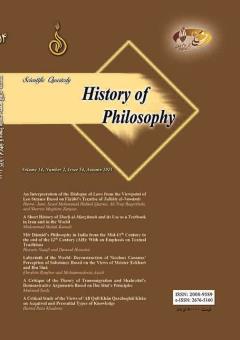Labyrinth of the World: Deconstruction of Nicolaus Cusanus’ Perception of Substance Based on the Views of Meister Eckhart and Ibn Sīnā
Subject Areas : Interation of thoughts, effects of philosophers’ ideas on society and future philosophical standpoints
Ebrahim Ranjbar
1
![]() ,
Mohammadreza Asadi
2
,
Mohammadreza Asadi
2
1 - PhD Candidate of Philosophy, Allameh Tabataba’i University, Tehran, Iran
2 - Associate Professor, Philosophy Department, Allameh Tabataba’i University, Tehran, Iran
Keywords: Substance, infinite, creation out of nothing, Nicolaus Cusanus, Ibn Sīnā, Meister Eckhart,
Abstract :
Nicolaus Cusanus, the German Philosopher and theologian, tried to revise the metaphysical views of his time in his works. He tried to present his philosophical approach systematically by posing a number of innovative theories about creation, Man’s relationship with the infinite affair, motion, and knowledge, as well as by revising the common religious views regarding such theorems as the first sin and creation out of nothing. Here, the authors have initially tried to examine Cusanus’ important views about the relationship between Man and the infinite affair, and through which reveal that, from this point of view, there is only one substance in the world, and anything other than that is among its necessary accidents. Next, they propound the concepts of unfolding and folding and introduce a category called the trans-substantial motion in Cusanus’ specific reading. After discussing his views, the background of the formation of his approach are deconstructed. In doing so, Meister Eckhart’s interpretation of some sections of the Holy Book and some of Ibn Sīnā’s fundamental metaphysical views are presented. Then the authors argue that Ibn Sīnā’s innovative approaches and Meister Eckhart’s novel interpretations pave the context for postulating a new metaphysics that is different from the traditional one. This can introduce new perspectives for philosophical studies and shed a new light on the history of philosophical thought.
ابن¬سینا (1383) المبدأ و المعاد، بهاهتمام عبدالله نورانی، تهران: دانشگاه تهران.
ابن¬سینا (1389) الاهیات من کتاب الشفاء، تحقیق حسن حسن¬زاده آملی، قم: بوستان کتاب.
ابن¬سینا (1393) جامع البدایع، تدوین و تصحیح محی¬الدین صبری الکردی، تهران: سفیر اردهال.
ابن¬سینا (1398) تسع رسائل فی الحکمة و الطبیعیات، تقدیم و تنقیح ابراهیم رنجبر، قم: آیت اشراق.
رنجبر، ابراهیم؛ منفرد، مهدی (1400) «واسازیِ تلقی سنت یهودی از مسئلۀ خلق در سفر پیدایش از رهگذرِ تفسیر ملاصدرا از حدیث کنز مخفی»، جستارهای فلسفه دین، سال 10، شمارۀ 2، ص207ـ189.
رنجبر، ابراهیم؛ منفرد، مهدی (1402) «گردباد عالم¬ساز»؛ واسازی مفهوم «گردباد/ δίνη» در کیهانپیدایی امپدوکلس. تاریخ فلسفه، سال 13، شمارۀ 4، ص38ـ17.
Biblia Hebraica Stuttgartensia (1997). German Bible Society; Compact edition.
Midrash Bereshit rabbah (1912) ed. by Ch. Albeck & J. Theodor, Berlin: Akademie Verlag.
Aristotle. (1831). Aristoteles Opera. Vol. I. ed. by I. Bekker. Berlin: Academia Regia Borussica.
Aristotle. (1843). Physica. ed. by I. Bekker. Typis et impensis Ge. Reimeri.
Dierkens, A. & de Ryke, B. (éd.). (2004). Maître Eckhart et Jan van Ruusbroec. Études sur la mystique “rhéno-flamande” (xiiie et xive siècles). Bruxelles: de l'Université de Bruxelles.
Eckhart, M. (2018). Studienausgabe der lateinischen Werke. Kohlhammer.
Kranz, W. (ed.). (1949). Vorsokratische Denker: Auswahl aus dem Überlieferten. Georg Olms Verlag.
Kurt, F. (2002). Meister Eckhart; Die Geburt der “Deutschen Mystik” aus dem Geist der arabischen Philosophie. München: Beck.
Larre, D. (ed.) (2005) Nicolas de Cues, penseur et artisan de l’unité. Lyon: ENS. DOI: https://doi.org/10.4000/books.enseditions.28505.
Pasqua, H. (2015). Maître Eckhart et Nicolas de Cues. Revue Thomiste. vol. 115, no. 4, p. 653-696.
Vansteenberghe, E. (1974). Le Cardinal Nicolas de Cues (1401-1464): l'action-La pensee. Switzerland: Slatkine Reprints.
Vianu, S. (2000). L'intellect divin et l'intellect humain selon maître Eckhart. Revue de Théologie et de Philosophie. vol. 132, no. 3, pp. 223-237.
Von Kues, N. (1967). Werke. 2 Bände. Berlin: De Gruyter Berlin.


